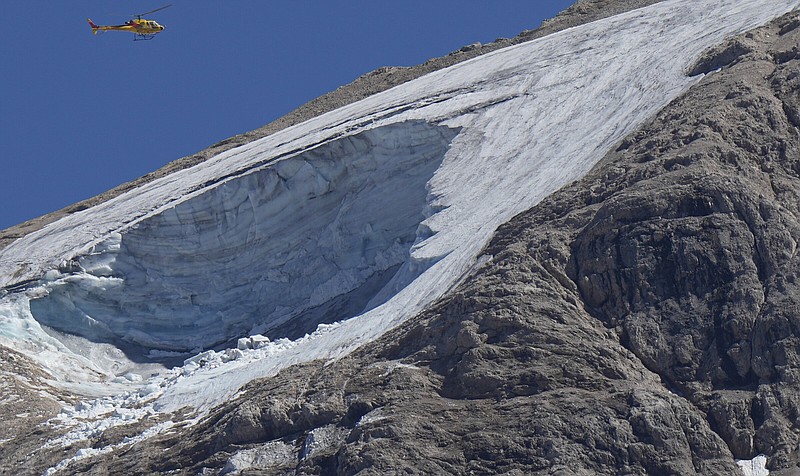CANAZEI, Italy -- Thunderstorms hampered the search Monday for more than a dozen hikers who remained unaccounted for a day after a chunk of an Alpine glacier in Italy broke off, sending an avalanche of ice, snow and rocks down the slope. Officials put the known death toll at seven.
"I hope the numbers stop here," said Veneto Gov. Luca Zaia, whose region in northeast Italy borders the Dolomite mountain range including the Marmolada glacier. He spoke in the resort town of Canazei, where a morgue was set up in the ice rink.
Another regional leader, Maurizio Fugatti, said 14 people remained unaccounted for by Monday afternoon: 10 Italians, three from the Czech Republic and one from Austria. Local officials later said Austrian consular officials had made contact with the Austrian.
"We were contacted by families, because these people didn't return home,'" said Fugatti of the Trentino-Alto Adige Alpine region.
In the mountain's parking lot four cars remained whose occupants hadn't been traced; two cars had license plates from the Czech Republic; one vehicle was from Germany; and the fourth was from Hungary.
At least three of the dead were Italians, authorities said. Italian news reports said one of the deceased was from the Czech Republic.
One of the Italians was Filippo Bari, 28, who snapped a selfie with the Marmolada glacier in the background, only minutes before the avalanche, his brother, Andrea, told state TV in Canazei, where he came to identify the body.
On Sunday, officials said nine people were injured, but on Monday told reporters in Canazei that eight were injured, including two in grave condition.
Zaia said the hospitalized included two Germans and a 40-year-old patient yet to be identified.
The avalanche came roaring down when dozens of hikers were on excursions, including some of them roped together.
Looking grim after meeting with families of some of the dead, Italian Premier Mario Draghi demanded that action be taken, so such a tragedy doesn't happen again.
"Today, Italy cries for the victims. All Italians embrace them with affection," Draghi said. "The government must reflect on what happened and take measures, so that what happened has a very low probability of happening again or being avoided entirely."
The detached portion of the glacier was estimated at 218 yards wide, 87 yards tall and 65 yards deep.
Italy is in the grips of a weeks-long heat wave, and Alpine rescuers said that the temperature at the glacier's altitude last week topped 50 F when usually it should hover around freezing at this time of year.
What exactly caused a pinnacle of the glacier to break off and thunder down the slope at a speed estimated by experts at nearly 200 mph wasn't immediately known, but high temperatures were widely cited as a factor.
Operators of rustic shelters along the mountainside said temperatures at the 6,600-foot level recently reached 75 F -- unheard of in a place where excursionists go in summer to keep cool.
The glacier is the largest in the Dolomite mountains. People ski on it in the winter, but the glacier has been rapidly melting away over the past decades, with much of its volume gone.
The Mediterranean basin, which includes southern European countries like Italy, has been identified by U.N. experts as a "climate change hot spot," likely to suffer heat waves and water shortages, among other consequences.
Pope Francis tweeted an invitation to pray for the avalanche victims and their families.
"The tragedies that we are experiencing with climate change must push us to urgently search for new ways that are respectful of people and nature," Francis wrote.
